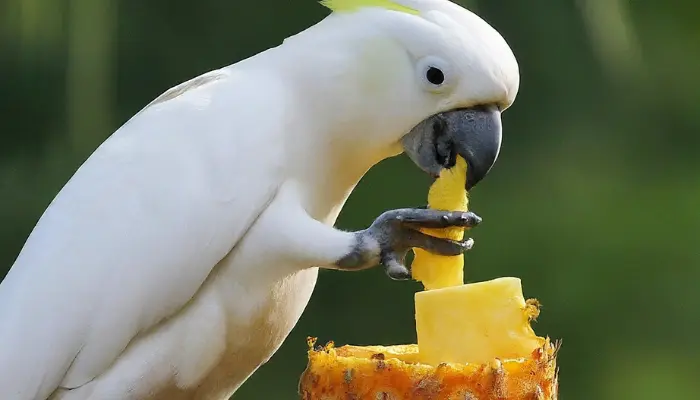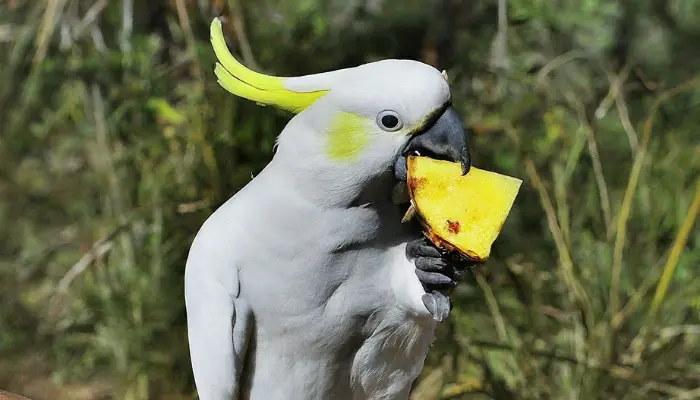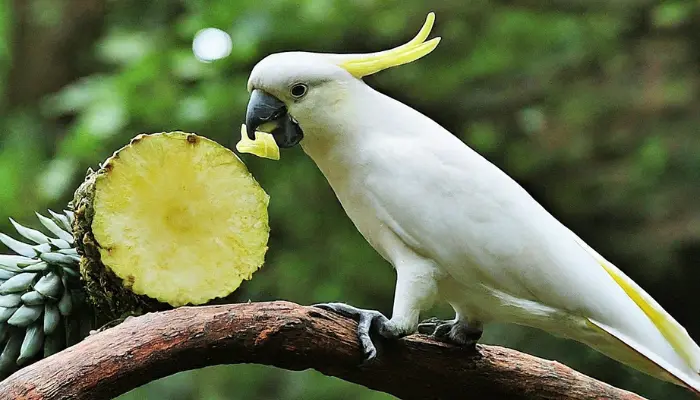Yes, cockatoos can eat pineapple in moderation. Pineapple can be a tasty and nutritious treat for cockatoos. However, it is essential to offer it in small quantities and ensure that it is fresh and free from any pesticides or additives. Like any new food, introduce pineapple gradually into their diet to see how they respond and to avoid any digestive issues.
Nutritional Needs of Cockatoos
Cockatoos like all birds have specific nutritional needs to stay healthy. Here is an overview.
- Pelleted Diet: The foundation of a cockatoo’s diet should be high-quality pelleted food formulated specifically for cockatoos or large parrots. Pellets ensure that your cockatoo receives a balanced diet with essential nutrients.
- Fresh Fruits and Vegetables: Cockatoos enjoy a variety of fresh fruits and vegetables as part of their diet. Offer a selection such as apples, oranges, bananas, grapes, carrots, broccoli, spinach, and sweet potatoes. These provide essential vitamins, minerals, and fiber.
- Healthy Seeds and Nuts: While seeds and nuts can be part of a cockatoo’s diet, they should be offered in moderation due to their high-fat content. Suitable options include sunflower seeds, pumpkin seeds, almonds, and walnuts. Rotate these treats to provide variety.
- Protein: Cockatoos need sources of protein in their diet. This can come from cooked eggs, cooked poultry (chicken or turkey), and legumes like lentils or beans. Make sure any meat or eggs are thoroughly cooked and free from seasoning.
- Calcium: Cockatoos require calcium for strong bones and egg production (if applicable). Offer calcium-rich foods such as leafy greens, broccoli, sesame seeds, and cuttlebone or mineral blocks.
- Hydration: Ensure your cockatoo has access to clean, fresh water at all times. Change the water daily to prevent bacterial growth and contamination.
- Supplementation: In consultation with a avian veterinarian, you may need to supplement your cockatoo’s diet with additional vitamins or minerals if deficiencies are identified.
Remember that every cockatoo is unique, so it’s essential to monitor your bird’s health and adjust its diet accordingly. Regular veterinary check-ups can also help ensure your cockatoo is receiving the right nutrition for its needs.
Importance of Offering a Diverse Diet for Cockatoos.
Offering a diverse diet for cockatoos is crucial for their overall health and well-being. Here are some reasons why.
- Nutritional Balance: Cockatoos, like all birds, require a balanced diet to thrive. A diverse diet ensures they receive all the essential nutrients, vitamins, and minerals they need to maintain optimal health. Different foods provide different nutrients, so offering variety helps cover all their nutritional requirements.
- Prevention of Malnutrition: A monotonous diet can lead to malnutrition or deficiencies in certain nutrients. For example, a diet solely based on seeds may lack essential vitamins and minerals, leading to health problems such as poor feather quality, weakened immune system, and metabolic disorders.
- Mental Stimulation: Offering a variety of foods stimulates a cockatoo’s mental faculties. Foraging for different foods and exploring new tastes and textures keeps them mentally engaged and prevents boredom, which is crucial for their psychological well-being.
- Behavioral Enrichment: Cockatoos are intelligent and curious birds that need mental and physical stimulation to prevent boredom and undesirable behaviors like feather plucking or excessive screaming. Introducing new foods and methods of food presentation, such as hiding treats in foraging toys or offering fresh fruits and vegetables, provides enrichment and keeps them entertained.
- Disease Prevention: A diverse diet can also help prevent certain health issues in cockatoos. For example, incorporating fresh fruits and vegetables into their diet can boost their immune system and help prevent diseases. Additionally, certain foods may have antioxidant properties that protect against cell damage and reduce the risk of age-related illnesses.
- Longevity: Providing a diverse diet can contribute to a cockatoo’s longevity and overall quality of life. A well-nourished bird is more likely to live a longer, healthier life free from nutrition-related health problems.

Benefits and Risks of Pineapple for Cockatoos
Pineapple can be a delicious treat for cockatoos, but like any food, it is important to consider both the benefits and potential risks.
Benefits of Pineapple for Cockatoos
- Vitamins and Minerals: Pineapple contains essential vitamins like Vitamin C, which boosts the immune system and promotes overall health. It also contains minerals such as manganese, which is important for bone health and metabolism.
- Hydration: Pineapple has a high water content, which can help keep cockatoos hydrated, especially during warmer weather.
- Variety in Diet: Introducing pineapple can add variety to a cockatoo’s diet, which can help prevent boredom and encourage them to eat a wider range of foods.
Risks of Pineapple for Cockatoos
- Acidity: Pineapple is acidic, which can potentially cause digestive upset or irritation in some cockatoos, especially if fed in large quantities. This is particularly important for birds with sensitive digestive systems.
- Allergies: Like with any new food, there’s always a risk of allergic reactions in some birds. It’s essential to monitor the cockatoo closely after introducing pineapple to ensure there are no adverse reactions.
- Digestive Issues: The fibrous nature of pineapple can be difficult for some birds to digest, potentially leading to gastrointestinal problems such as diarrhea or crop impaction if consumed in large quantities.
To mitigate risks, it is advisable to introduce pineapple gradually into a cockatoo’s diet and monitor their response. Moderation is key, and pineapple should only be offered as an occasional treat rather than a staple food. Always consult with a avian veterinarian for specific dietary recommendations tailored to your cockatoo’s individual needs and health status.

Expert Opinions and Research Findings on Feeding Pineapple to Cockatoos
Feeding pineapple to cockatoos can be a contentious topic among bird owners due to concerns about its high sugar content and acidity. While some believe that small amounts of pineapple can be included in a cockatoo’s diet as an occasional treat, others argue that it should be avoided altogether.
Here are some expert opinions and research findings on feeding pineapple to cockatoos.
- High Sugar Content: Pineapple contains natural sugars, primarily fructose. Excessive sugar intake can lead to health issues in birds, including obesity, diabetes, and digestive problems.
- Acidity: Pineapple is acidic, which can potentially cause gastrointestinal upset and irritation in some birds, particularly those with sensitive digestive systems like cockatoos.
- Vitamin C: Pineapple is a good source of vitamin C, which is essential for a bird’s overall health and immune function. However, cockatoos can obtain sufficient vitamin C from other fruits and vegetables without the risks associated with pineapple.
- Moderation is Key: Some avian experts suggest that pineapple can be given to cockatoos in small amounts as an occasional treat, but it should not be a staple part of their diet. It’s essential to monitor how your bird reacts to pineapple and consider their individual dietary needs and health status.
- Variety in Diet: Cockatoos thrive on a diverse diet that includes a variety of fruits, vegetables, grains, and protein sources. Instead of relying on pineapple as a source of nutrients, it’s better to offer a range of bird-safe fruits and vegetables to ensure a balanced diet.
- Consulting with Avian Veterinarians: If you’re unsure about whether pineapple is suitable for your cockatoo, it’s best to consult with an avian veterinarian who can provide personalized dietary recommendations based on your bird’s specific needs and health status.
Conclusion
Offering pineapple to cockatoos can be good, but in moderation and with caution. Pineapple has vitamins and water, but it is acidic and can upset their stomachs if they eat too much. Introduce it slowly, watch for problems, and talk to a bird vet. It is best to give cockatoos a mix of foods like pellets, fruits, veggies, seeds, nuts, and proteins to keep them healthy and happy.
